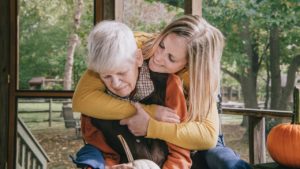Has your older loved one been in the hospital since the Coronavirus Pandemic and not allowed to have family by their side to comfort and advocate for them?
This experience is incredibly upsetting for families… because in times of suffering and illness, it’s healthy to reach to others for closeness. In fact, being physically close with our loved ones when we’re sick actually provides comfort and helps us to heal.
This is a cruel irony indeed. On one hand, physical comfort is healing and protective… and on the other hand, with COVID, physical closeness can cause us harm. Social distancing while our loved ones are sick, has taken away one of our healthiest coping and soothing strategies.
Here are just a couple of statements I’ve heard from the people I work with. Can you relate?
“My aging parent needs me. They’re not going to have anybody there to advocate for them in the hospital.”
“I’ve been married 60 years! I need to be by her side. I’ve been there every step of the way and now I can’t be with her.”
As if illness isn’t hard enough, now there’s separation to contend with as well. Please hear me when I say: You’re not alone. We’re in this together
You may be surprised to learn that there’s actually a name for what is happening. It’s called Ambiguous Loss.
So, in today’s podcast, to help us move through this pain and loss, I talk about anticipatory grief and ambiguous loss during COVID-19 especially as they relate to older adults and their families. And, I offer suggestions for moving through grief during the Coronavirus pandemic.
Here’s a look at what I talk about in this episode…
- [02:47] Everything you need to know about anticipatory grief, starts here.
- [04:08] When we begin to process grief, there’s a common experience of reflecting on missed opportunities in the past and anticipating losses in the future. Learn why.
- [06:02] COVID-19 is de-stabilizing life as we knew it and triggering anticipatory grief. As humans, however, we are no strangers to this type of grief, we experience it all throughout our lives.
- [10:47] You may be surprised to hear that I am grateful for the concept of ambiguous loss. I explain why.
- [12:59] There are two types of Ambiguous Loss. Part One: Psychological Presence and Physical Absence is described here. We are experiencing a tremendous amount of this type of loss during the Coronavirus Pandemic.
- [15:46] The second type of Ambiguous Loss is when there is a Psychological Absence and a Physical Presence, like with dementia. This is one of the reasons caring for a loved one with dementia is so incredibly painful.
- [18:16] I share several recommendations for helping you to move through anticipatory grief and ambiguous loss with
By the end of this episode, you’ll have a language for talking about how complicated what you’re going through actually is during COVID-19 and why you may be feeling drained at the end of the day. You’ll understand that grief is a natural human experience and the more we can acknowledge it, normalize it, and find ways to work with it and through it, the better and healthier we’ll all be.
Links mentioned in this episode:
- Life, Love, and Alzheimer’s: Interview with Lauren Dykovitz
- Ambiguous Loss with Dr. Pauline Boss
- Podcast #004 Older Adults, Families, and Senior Care Communities Working Together During COVID-19
- COVID-19 Wellness Guide for Older Adults
- Blog: Social distancing doesn’t have to mean social isolation for Older Adults
- Fatherly article: That COVID Feeling? Its Called Anticipatory Grief
- Insider article: What are the Stages of Grief? How to Process and Deal with Grief and Loss.





